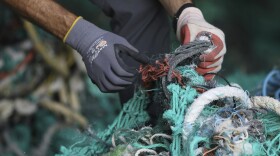A trust founded by Queen Lili?uokalani, Hawai?i’s last-reigning monarch, is expanding to adapt to the changing needs of the most vulnerable Native Hawaiian children. But recent decisions by Lili?uokalani Trust leadership, including staff layoffs and site closures, are creating confusion for some in the community who want answers.
The sudden closure of two Queen Liliuokalani Children’s Centers or k?puka on O’ahu – one in Punalu?u and another in Honolulu – surprised many in the surrounding communities. One, 77-year-old Gwen Kim, a retired social worker who spent three decades with the Lili?uokalani Trust, is skeptical of the moves.
“There’s nothing wrong with expanding services but why get rid of effective current services that were in the heartlands?” says Kim.
The Hale ?Aha site in Punalu?u where Kim once worked and the Mu?olaulani site in Kap?lama closed their doors Tuesday, with 13 staff either laid off or transferred. No plans are in place for the future of these trust lands, which have a combined assessed value of nearly $15 million.
N?lei Akina, vice president and chief programming officer for the Lili?uokalani Trust, says the closure was not an easy decision, but a necessary one, in part because of the COVID-19 pandemic and the need to transition to a more mobile service delivery model.
“We’ve actually canceled all of our in-person programming 'til the end of June,” says Akina. “Our social services are now being provided through centralized screening telemedicine and other virtual tools to better reach those children and families where they are.”
In 1911, Queen Lili?uokalani left nearly her entire estate of more than 6,000 acres to care for orphaned and disadvantaged Native Hawaiian children. Over the past century, the work of the Lili?uokalani Trust became a model for culture-based and place-based social services for Native Hawaiian youth. In recent years, the Trust began to reposition its assets to ensure the long-term viability of its work, including the sale land beneath two Waik?k? hotels for $273 million last year.
"The Lili’uokalani Trust is committed to ensuring that our Queen’s resources serve of course our Native Hawaiian orphans and destitute Native Hawaiian children today as well as tomorrow as a perpetual trust," says Akina.
The site closures are part of this repositioning of asssets. But Kim, the retired social worker, says her frustration is with the lack of communication and community outreach.
"This is supposed to be transparent," says Kim, "How come all these decisions are being made in such a secret way?"
Cynthia Jordan, communications director for the Lili?uokalani Trust, said in an emailed statement that the trust is committed to making data-informed decisions both quantitative and qualitative. While there was no evidence of community meetings prior to the closures, Jordan did reference a 2017 gathering of leaders from Native Hawaiian-serving organizations who offered their feedback on the Trust's work.
The closure comes as the trust unveils a new strategic plan aimed at breaking the cycle of poverty for Native Hawaiian youth. Akina says Native Hawaiian children remain overrepresented in areas from foster care to juvenile justice and homelessness. She says some of trust's major initiatives aim to address these issues and are scheduled to come online in the next five years.
“Recently in Honolulu, we just launched an 18-unit residential program for youth, Native Hawaiian youth, that have been impacted by COVID and are at risk for being homeless,” says Akina. ”We'll also be opening an early childhood center in West O?ahu where we'll be having a multi-generational program for parenting youth. So we'll have 40 units of housing there.”
And that’s just the start. Over the last five years, the trust purchased more than $26 million in property to expand its reach to communities where it says it can make the most impact. Earlier this year, the trust also expanded its reach beyond keiki to include young adults up to age 26. But for the communities that are feeling left behind by the trust’s new direction, it’s already a difficult transition.




